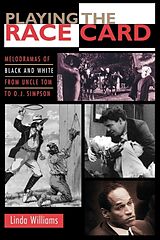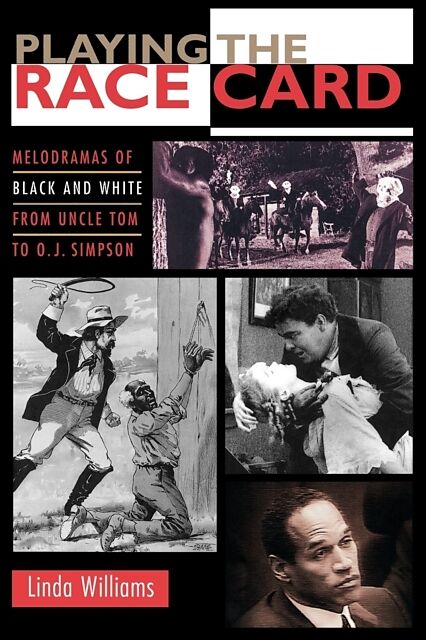Playing the Race Card
Einband:
Kartonierter Einband
EAN:
9780691102832
Untertitel:
Melodramas of Black and White from Uncle Tom to O. J. Simpson
Genre:
Kunst
Autor:
Linda Williams
Herausgeber:
Princeton University Press
Anzahl Seiten:
420
Erscheinungsdatum:
23.09.2002
ISBN:
069110283X
Zusatztext "Broad and brilliant, a combination rare in serious books these days, Playing the Race Card argues persuasively that melodrama has profoundly affected American attitudes toward race over the last century and a half. . . . Williams's success is to spell out exactly how the melodramatic imagination of our popular culture shapes how we live and understand race in America and how these stories make as well as narrative history." ---Grace Elizabeth Hale, The Historian Informationen zum Autor Linda Williams Klappentext The black man suffering at the hands of whites, the white woman sexually threatened by the black man. Both images have long been burned into the American conscience through popular entertainment, and today they exert a powerful and disturbing influence on Americans' understanding of race. So argues Linda Williams in this boldly inquisitive book, where she probes the bitterly divisive racial sentiments aroused by such recent events as O. J. Simpson's criminal trial. Williams, the author of Hard Core, explores how these images took root, beginning with melodramatic theater, where suffering characters acquire virtue through victimization. The racial sympathies and hostilities that surfaced during the trial of the police in the beating of Rodney King and in the O. J. Simpson murder trial are grounded in the melodramatic forms of Uncle Tom's Cabin and The Birth of a Nation. Williams finds that Stowe's beaten black man and Griffith's endangered white woman appear repeatedly throughout popular entertainment, promoting interracial understanding at one moment, interracial hate at another. The black and white racial melodrama has galvanized emotions and fueled the importance of new media forms, such as serious, "integrated" musicals of stage and film, including The Jazz Singer and Show Boat. It also helped create a major event out of the movie Gone With the Wind, while enabling television to assume new moral purpose with the broadcast of Roots. Williams demonstrates how such developments converged to make the televised race trial a form of national entertainment. When prosecutor Christopher Darden accused Simpson's defense team of "playing the race card," which ultimately trumped his own team's gender card, he feared that the jury's sympathy for a targeted black man would be at the expense of the abused white wife. The jury's verdict, Williams concludes, was determined not so much by facts as by the cultural forces of racial melodrama long in the making. Revealing melodrama to be a key element in American culture, Williams argues that the race images it has promoted are deeply ingrained in our minds and that there can be no honest discussion about race until Americans recognize this predicament. Zusammenfassung The black man suffering at the hands of whites, the white woman sexually threatened by the black man. Both images have long been burned into the American conscience through popular entertainment, and they exert a disturbing influence on Americans' understanding of race. This work explores how these images took root. Inhaltsverzeichnis Illustrations ix Preface xiii Acknowledgments xvii Introduction: Playing the Race Card 3 Chapter One: The American Melodramatic Mode 10 Chapter Two: "A Wonderful! 'Leaping 'Fish": Varieties of Uncle Tom 45 Chapter Three: Anti-Tom and The Birth of a Nation 96 Chapter Four: Posing as Black! Passing as White: The Melos of Black and White Melodrama in the Jazz Age 136 Chapter Five: Rewriting the Plantation Legend: Scarlett "Totes a Weary Load" 187 Chapter Six: Home Sweet Africa: Alex Haley's and TV's Roots 220 Chapter Seven: Trials of Black and White: California v. Powell and The People v. Orenthal James Simpson 252 Conclusion: Our Melodramatic Racial Fix 296 Notes 311 Bibliography 369 Index 385 ...
"Broad and brilliant, a combination rare in serious books these days, Playing the Race Card argues persuasively that melodrama has profoundly affected American attitudes toward race over the last century and a half. . . . Williams's success is to spell out exactly how the melodramatic imagination of our popular culture shapes how we live and understand race in America and how these stories make as well as narrative history."---Grace Elizabeth Hale, The Historian
Autorentext
Linda Williams
Klappentext
The black man suffering at the hands of whites, the white woman sexually threatened by the black man. Both images have long been burned into the American conscience through popular entertainment, and today they exert a powerful and disturbing influence on Americans' understanding of race. So argues Linda Williams in this boldly inquisitive book, where she probes the bitterly divisive racial sentiments aroused by such recent events as O. J. Simpson's criminal trial. Williams, the author of Hard Core, explores how these images took root, beginning with melodramatic theater, where suffering characters acquire virtue through victimization. The racial sympathies and hostilities that surfaced during the trial of the police in the beating of Rodney King and in the O. J. Simpson murder trial are grounded in the melodramatic forms of Uncle Tom's Cabin and The Birth of a Nation. Williams finds that Stowe's beaten black man and Griffith's endangered white woman appear repeatedly throughout popular entertainment, promoting interracial understanding at one moment, interracial hate at another. The black and white racial melodrama has galvanized emotions and fueled the importance of new media forms, such as serious, "integrated" musicals of stage and film, including The Jazz Singer and Show Boat. It also helped create a major event out of the movie Gone With the Wind, while enabling television to assume new moral purpose with the broadcast of Roots. Williams demonstrates how such developments converged to make the televised race trial a form of national entertainment. When prosecutor Christopher Darden accused Simpson's defense team of "playing the race card," which ultimately trumped his own team's gender card, he feared that the jury's sympathy for a targeted black man would be at the expense of the abused white wife. The jury's verdict, Williams concludes, was determined not so much by facts as by the cultural forces of racial melodrama long in the making. Revealing melodrama to be a key element in American culture, Williams argues that the race images it has promoted are deeply ingrained in our minds and that there can be no honest discussion about race until Americans recognize this predicament.
Inhalt
Illustrations ix Preface xiii Acknowledgments xvii Introduction: Playing the Race Card 3 Chapter One: The American Melodramatic Mode 10 Chapter Two: "A Wonderful, 'Leaping 'Fish": Varieties of Uncle Tom 45 Chapter Three: Anti-Tom and The Birth of a Nation 96 Chapter Four: Posing as Black, Passing as White: The Melos of Black and White Melodrama in the Jazz Age 136 Chapter Five: Rewriting the Plantation Legend: Scarlett "Totes a Weary Load" 187 Chapter Six: Home Sweet Africa: Alex Haley's and TV's Roots 220 Chapter Seven: Trials of Black and White: California v. Powell and The People v. Orenthal James Simpson 252 Conclusion: Our Melodramatic Racial Fix 296 Notes 311 Bibliography 369 Index 385

Leider konnten wir für diesen Artikel keine Preise ermitteln ...
billigbuch.ch sucht jetzt für Sie die besten Angebote ...
Die aktuellen Verkaufspreise von 6 Onlineshops werden in Realtime abgefragt.
Sie können das gewünschte Produkt anschliessend direkt beim Anbieter Ihrer Wahl bestellen.
Loading...
Die aktuellen Verkaufspreise von 6 Onlineshops werden in Realtime abgefragt.
Sie können das gewünschte Produkt anschliessend direkt beim Anbieter Ihrer Wahl bestellen.
| # | Onlineshop | Preis CHF | Versand CHF | Total CHF | ||
|---|---|---|---|---|---|---|
| 1 | Seller | 0.00 | 0.00 | 0.00 |
